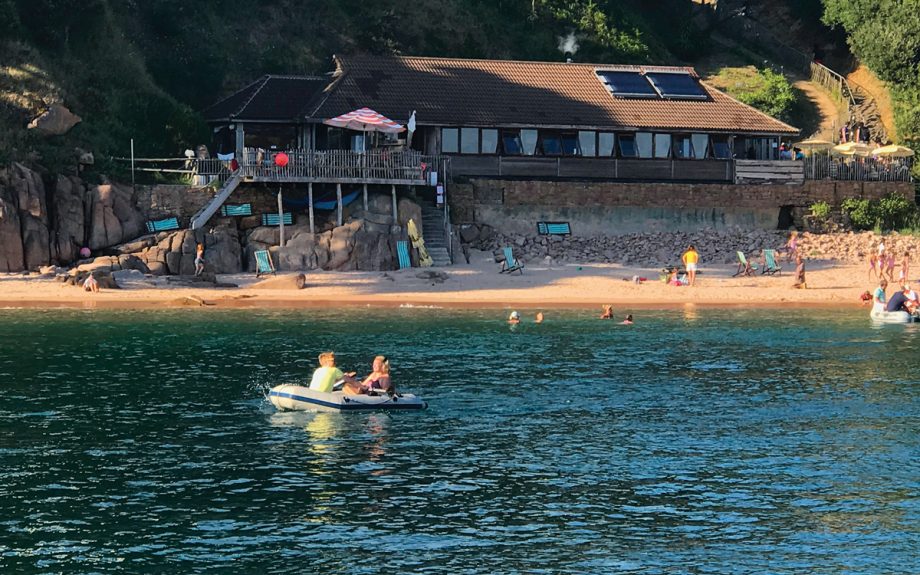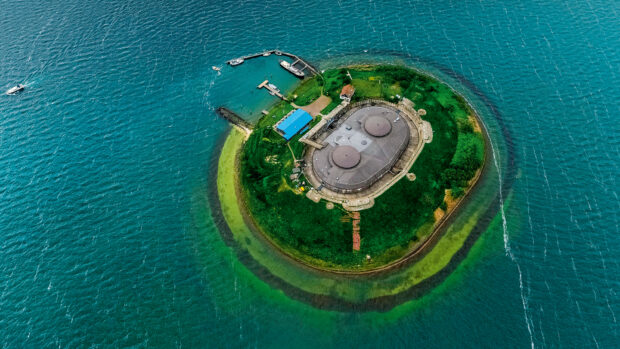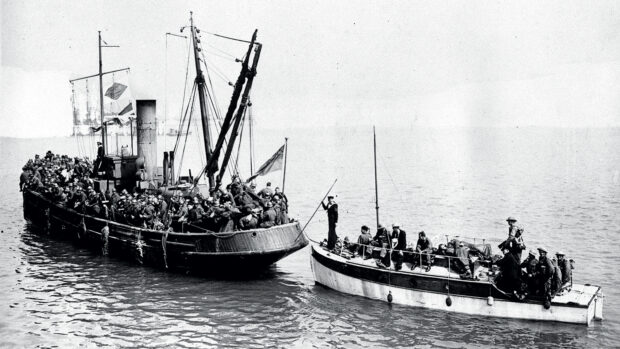In my humble opinion as a television travel journalist of more than 30 years’ experience, the Channel Islands are without doubt one of the best places on this planet to live, work and play, writes Richard Hall.
Being a group of islands surrounded by the sea means boats of all shapes and sizes are almost a compulsory purchase here. I bought my first speedboat at 16 and within months found myself racing between Jersey, France and Guernsey at breakneck speeds. In those pre-GPS days, my navigation was a simple point to point exercise with soggy charts, a compass, dividers and a lot of luck.
I was and still am a petrolhead. Slightly embarrassing for me to admit as Commodore of the Royal Channel Islands Yacht Club, whose members are predominantly of the ‘rag and stick’ variety.
I currently own a Fairline Targa 38 called Swift Turn. Built in 1994, she is almost a classic vintage but was fully refitted in 2018 and, like most Fairlines, has aged extremely well. Her distinctive hull still looks in keeping with the modern, sleek style of craft being produced today.
 Watch the video
Watch the videoDespite the Targa 38 model name, she is actually 39ft 6in long – unless of course I’m filling in a marina form, when she is only just 38 feet!
Channel Islands boating tips
So, what about boating in Jersey? Well, when I was first asked to write this article, I was tempted to write about the proximity of the French coast, just 12nm away at its closest point, and the many wonderful ports around an hour’s cruise away at 24 knots. But MBY editor Hugo asked me to stick to the Channel Islands themselves.

The author’s Fairline Targa 38 Swift Turn is perfect for exploring the local beaches, bays and reefs
It’s probably just as well, as this year, for obvious reasons, ‘La Belle France’ has been strictly out of bounds. Not since the island’s occupation in World War Two has France been off limits and truly off our radar. It’s so very strange to look across to a land that is so close and yet so far away.
But there is always a silver lining in every cloud and this temporary ban on travel has led to a new invigoration of local waters, with many boat owners circumnavigating the island for the very first time and many more expected to make the crossing from the UK this summer.
Article continues below…

Crossing the English Channel by boat: Everything you need to know

Channel Islands boating: Local’s guide to Guernsey and its stunning neighbours
Just be sure to check the latest Covid regulations on www.gov.je before setting off as you may need to fill in a health check form and take a test on arrival.
Once you have made your way across the English Channel, Jersey is blessed with some of the most beautiful bays and beaches in the world but perhaps the most fascinating and unusual places to explore are the outlying reefs rich with their sandbars, natural pools for swimming and abundant wildlife.
If you want to see dolphins and seals look no further. To keep things manageable I will concentrate on the south coast but as a visiting boater please remember that with some spring tides reaching 40 feet, Jersey has one of the largest tidal ranges in the world – so much so that the island’s landscape almost doubles in size twice a day. So do keep a regular eye on your depth gauge and check your charts even closer than usual!

Kayaks are a great way to explore the rocks and reefs
First off ‘west is best!’ I’m allowed to declare that because I grew up in the western parish of St Brelade. So, we start west and head east to discover some of Jersey’s finest nautical spots.
St Brelade’s Bay
Located on Jersey’s south-west coast, the bay of St Brelade has a picturesque drying harbour and is a regular spot for pier jumping with children and adults alike. For a sheltered spot, drop anchor just to the east of the inner jetty. With its palm trees and soft golden sand this is by far Jersey’s most popular beach and was voted one of the UK’s top three beaches in 2019.
Lined with a mix of restaurants from fine dining to ‘bucket and spade’ cafés, a day trip here is an absolute must. Whilst ashore take time to visit the fisherman’s chapel built in the 11th Century where cod fishing fleets would ask to be blessed before sailing to Nova Scotia in the 18th Century.

Swimming off the boat in Portelet Bay in the shadow of Janvin’s Tomb
Portelet Bay
Portelet is simply stunning and a very popular anchorage. In the middle of the bay is a small Martello tower built in 1808 known to locals as Janvin’s Tomb where a local seafarer, who died of the plague, was buried to protect Jersey from the lethal contagion.
Care needs to be taken on entry here as there are unmarked rocks that only cover at high water. Follow the locals and keep to the west side of the bay, drop anchor and get the dinghy ready to enjoy not just a beautiful sandy beach but also takeaway wood-fired pizza from a family run café sat at the base of some very steep steps that non boat owners have to negotiate to enter this magical spot. Don’t dawdle too long though, as you need to be prepared to drop back south as the tide recedes.
St Aubin’s Bay
One of the island’s biggest bays and one of the easiest to navigate is St Aubin’s Bay, which stretches from St Helier (the island’s capital in the east) to the village and port of St Aubin in the west.

St Aubin’s Bay is the perfect spot for sundowners
The quaint tidal harbour in St Aubin is a foodie’s paradise and is surrounded by restaurants and bars. If you can dry out and stay for a night or two this is a must visit. There are just a few spaces alongside the inner harbour wall with water and power as you enter on the starboard side.
Well worth a visit (I know I am biased) is the Royal Channel Islands Yacht Club, its status granted by Queen Victoria in 1862, making it the sixth oldest Royal Yacht Club in the world. Our club welcomes visiting craft of all kinds and boasts some of the best views and food (fresh crab, moules à la crème, sea bass, amazing steaks and pies) in Jersey from its restaurant.
One of my favourites is St Aubin’s fort built in the 16th Century on a tidal island. It’s a wonderful place to stop for a picnic and explore the local area. This is also a perfect ‘sundowners’ location if you can match tide and time. Moor up on either pier but keep an eye on your lines for the rise and drop of our big tides. If you can’t dry out, you will only have around two hours either side of high water.

Enjoy fresh crab and mussels at the RCIYC in St Aubin
If you just fancy a lazy day onboard with spectacular views then just south of St Aubin’s fort is Belcroute, a very small and pretty cove that’s quite popular with local boat owners as it’s a safe anchorage and well sheltered from easterly winds so is reasonably calm within the bay.
St Helier
On approach to St Helier maintain a listening watch on Channel 14. The main harbour is commercial so follow the port traffic signals when entering the Victoria Pierhead. Once through, turn to port and head north to the marina which opens three hours either side of high water. The visitor berths are normally on Piers A, D, E, and F, with five metres above chart datum maintained by a sill. At busy times be prepared to raft.

The entrance to St Helier Marina
The marina is by far the best way to arrive in St Helier – and currently the only permitted port of entry. Driven by finance, the town itself isn’t quaint anymore (I’m very jealous of St Peter Port in our sister isle) but it is the place to shop until you drop.
With Michelin restaurants, trendy bars and nightclubs galore, be prepared for a few ‘accidental’ late nights out and make sure to check your mooring lines are tidy as you leave your boat!
Gorey Harbour
To head to the far east of the island from St Helier by car should only take ten minutes or so. By sea it is a very different story and presents a real navigational challenge to cover the 13 or so nautical miles while avoiding the most treacherous reefs that lie off Jersey’s east coast. For motor boats cruising at 22 knots the trip on a smooth day will take a good 35 minutes.

Mont Orgeuil Castle keeps guard over Gorey Harbour. Photo: Gavin Hellier / Alamy Stock Photo
But it is worth it, as Gorey’s castle is such an iconic landmark. It sits proudly above a small tidal drying harbour that, like St Aubin, is lined with superb bars and restaurants.
The harbour provides moorings and shelter with some visitors’ holding buoys available at the south-western edge of the harbour. There is also a handful of upper beach moorings available but only during the summer season.
If staying overnight, Gorey offers perfect positioning to head to the first of our offshore reefs – Les Ecrehous which, although halfway to the French coast, provide a pleasant short cruise at 6.5 nm away.

The tiny main island of Les Ecrehous
Jersey’s Offshore Reefs
The reefs of Jersey are spectacular with increasing numbers of visitors, partially thanks to the recent COVID-19 travel restrictions to France.
Too many boats pose a real threat to the environment, so please research local guidelines before your trip and always observe the 5 knot limit in designated areas.
Common sense prevails, so don’t get too close to the dolphins and seals and be as quiet as possible so as not to disturb the wildlife.
Les Ecrehous
Breathtakingly beautiful, Les Ecrehous is a small group of islands just six miles from Jersey, which actually belong to the parish of St Martin. Although there are a handful of small houses here, nobody lives on the islands permanently.
With crystal clear waters, golden sandbanks and some of the best sunsets on the planet these remote islands attract not just human visitors but a wealth of wildlife including dolphins, grey seals and basking sharks. It’s a bird-watchers’ paradise too and so in 2005, Les Ecrehous, became a Ramsar site in order to protect the habitats of the many diverse species.
Pilotage-wise the safest approach is from the south-east; I’ll leave you to follow your charts from there. You can pick up bobbers in the sound but be warned of a very strong current at low tide. If you can dry out please be aware of some very uneven sandy sculpted surfaces!

One of the tidal sand banks at Les Minquiers
Les Minquiers
Les Minquiers, the southernmost part of the British Isles, is another marine environment protected under the Ramsar Convention and the laws of Jersey.
This is a vast outlying reef of jagged fang-like rocks, sandbars and Caribbean-like natural pools. Actually, at low tide the rock shelf around the Minquiers has a larger surface area than Jersey!
Again, like the Ecrehous, there are a few uninhabited houses on the main island, or Maitresse Isle, which also boasts a public loo – famed for being the most southernmost building in the British Islands. But, of course, it’s the natural scenery and wildlife that really has to be seen to be believed.

The jagged rocks of Les Minquiers
There is no way I would attempt to offer any pilotage advice – other than do not attempt an approach if you are of a nervous disposition! This reef of rocks was described as treacherous in the novel Ninety-Three written by the French novelist Victor Hugo (best known for Les Misérables and The Hunchback of Notre-Dame) who took residence in Jersey and Guernsey in exile from France. If charts and a sensible approach to this sanctuary of rocks isn’t adhered to, Victor’s warning still stands today.
I would recommend any first visit to be on a calm day and undertaken at very slow speeds with a bow lookout! Also, don’t arrive at the top of a big spring tide as there’s not much to see!
On arrival you will find that all the moorings are privately owned so if you do decide to pick one up always be ready to move off quickly should the owner arrive. If at anchor on the main island, the advice is to keep an anchor watch for two hours each side of high water.

This loo on Les Minquiers is the southernmost building in the British Isles
This is a wonderful place to spend the day at ease with nature, it’s perfect for kayaking, swimming and rock pooling with the children. If you do make the trip to this spectacular ‘wonder of the world’ on a calm and sunny day, you will be rewarded with one of the most memorable voyages of a lifetime.
Chausey
Right next door to the Minquiers and just off the French port of Granville lies the only French Channel Island of Chausey. With its bars and restaurants, it is without doubt my favourite but given I’m under orders to write about our British islands only…that’s another story!
For further information on the marinas, do visit marinas.digimap.gg which is a free website for boaters covering Channel Island, Normandy and Brittany marinas. Please also visit the Royal Channel Islands Yacht Club website.
You can now read the second part of this feature here.
First published in the April 2021 issue of Motor Boat & Yachting.
If you enjoyed this…
Be first to all the latest boats, gadgets, cruising ideas, buying advice and readers’ adventures with a subscription to Motor Boat & Yachting. Available in both print and digital formats, our monthly magazine will be sent directly to your home or device at a substantial discount to the usual cover price. See our latest offers and save at least 30% off the cover price.

Collecting takeaway pizzas by tender in Portelet Bay










